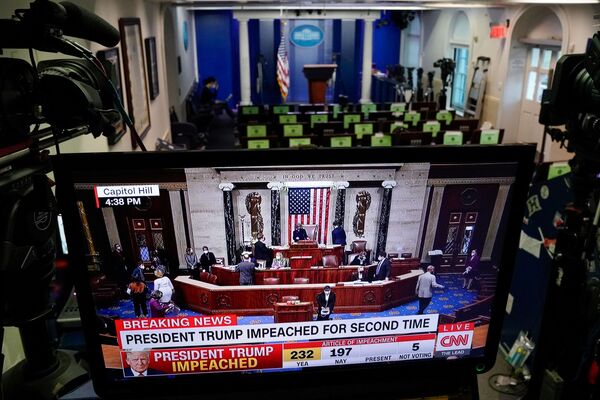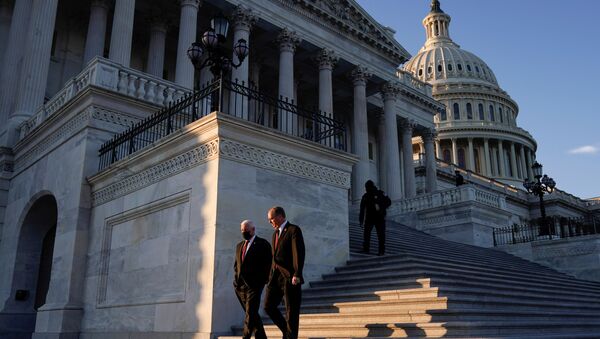In a historic move on Wednesday, the US House of Representatives voted 232 to 197 in favour of approving impeachment for Donald Trump, making him the first president in the history of the United States to be subjected to the procedure twice.
Among those to support the move to oust the president from power were at least 10 Republicans, who had broken ranks to vote with the Democratic opposition.
— The White House (@WhiteHouse) January 13, 2021
As the impeachment resolution now moves to the Senate, several questions now loom, such as whether or not the impeachment may result in a conviction, as well as if a trial can be held after the president leaves office and transfers power to President-elect Democrat Joe Biden.
Twice Impeached
In the wake of the deadly chaos that engulfed the US Capitol on 6 January, when a joint session of Congress convened to certify the Electoral College vote count in favour of Biden, the Democrats had been quick to accuse President Trump for ‘inciting the violence’.

Shortly after a "Stop the Steal" rally hosted by Donald Trump outside the White House where he reiterated that the election had been ‘stolen’ from him, crowds of the president’s supporters had stormed the Capitol, disrupting the procedure of certification of election results in Congress and resulting in 5 deaths, including that of a police officer.
Despite the outgoing president denying responsibility for inciting the insurrection, insisting he had never directly ‘egged’ his supporters on to violent actions, the impeachment article was introduced on 11 January by Democratic Congressman Ted Lieu.
Prior to that, the Democrats had urged Vice President Mike Pence to invoke the 25th Amendment to remove Donald Trump from office, however, the latter refused, citing that it was not “in the best interest of our nation or consistent with our Constitution.”
House Speaker Nancy Pelosi had warned that the House of Representatives would move on to impeachment if the Vice President declined to invoke the section of the 25th Amendment that would allow for Trump to be stripped of his power by the vice president and a majority of the Cabinet if the president was deemed "unable to discharge the powers and duties of his office."
Speaker Pelosi gavels in the final vote on the impeachment of President Trump.
— NBC News (@NBCNews) January 13, 2021
📷 J. Scott Applewhite / AP pic.twitter.com/wHtlKwOS9L
Timeline Considerations
After 13 January, when the US House of Representatives voted to impeach Trump on “incitement of insurrection”, all eyes turned to the Senate. Majority Leader Mitch McConnell, R-Ky. was urged to invoke a 2004 resolution that could bring the upper chamber of the United States Congress back for an emergency session to launch the impeachment trial.
With the inauguration of Joe Biden scheduled for 20 January, McConnell's office announced on Wednesday that it would not be invoking the resolution, signalling that any impeachment trial would be likely to start only after Donald Trump left office.

According to a memo issued by McConnell to Republican senators earlier, the Senate would not be able to reconvene until 19 January - a day before President-elect Joe Biden's swearing-in - without the consent of all 100 senators.
With the likelihood that at last one Trump loyalist senator will object to bringing the Senate back early, it is suggested that the earliest an impeachment trial could begin is 1 p.m. on 20 January - an hour after President-elect Biden is inaugurated.
The trial itself, if it takes place, could continue for weeks.
Legal, Constitutional Hurdles
Another issue is whether a Senate impeachment trial would be constitutional after Donald Trump has already vacated the White House. If the Senate moves forward with a trial, it could face legal hurdles.

In the opinion of J. Michael Luttig, formerly a judge for the US Court of Appeals for the 4th Circuit, the move would not be in line with the supreme law of the United States of America. Luttig wrote in an op-ed in the Washington Post on 12 January that the Constitution itself offers the clear answer that this cannot be done, as the Senate’s only power under the Constitution is to convict — or not — an incumbent president.
After Trump’s term ends on 20 January, Congress "loses its constitutional authority to continue impeachment proceedings against him — even if the House has already approved articles of impeachment", he writes.
According to the ex-judge, Trump would no longer be ‘incumbent in the Office of the President’ as the Senate began delayed proceeding, and, accordingly, he would no longer be subject to “impeachment conviction” by the Senate, under the Constitution’s Impeachment Clauses.
However, other experts have been cited by media to hold a different opinion, and bipartisan Senate leaders appear prepared to move forward with the procedure.
Mitch McConnell’s Democratic counterpart from New York, Minority Leader Sen. Chuck Schumer, has vowed that a trial would be held.
"Make no mistake, there will be an impeachment trial in the United States Senate. There will be a vote on convicting the president for high crimes and misdemeanours; and if the president is convicted, there will be a vote on barring him from running again," Schumer said in a statement released on Wednesday.
‘Valid’ Impeachment Trial
In similar instances in the past, when officials were impeached after leaving office, the US Senate voted to dismiss some of the cases on the basis that the subjects were no longer holding their positions. However, none of them were presidents.
In this case, although Donald Trump already has one foot out the door, a conviction in the Senate would allow Trump’s opponents to see him bared from running for office again in 2024 – something the outgoing president has indicated he has considered doing. Furthermore, Trump’s post-presidential benefits would be curtailed.
In December 2019 the House of Representatives voted to impeach Donald Trump the first time for putting pressure on Ukrainian President Volodymyr Zelensky to initiate an investigation against Hunter Biden, the son of the then-Democratic presidential candidate, Joe Biden.
Trump, represented at the time by both White House lawyers and private attorneys, was impeached for two articles: "abuse of power" and "obstruction of Congress", with the US Senate voting to allow the president to remain in the White House.
In the case of a second impeachment, coming after he leaves office, the question arises as to how Trump would be legally represented and who would foot the bill for the defence, as during the first impeachment, campaign finance records showed that at least two of the lawyers were paid for by the Republican National Committee.

Shortly after the House of Representatives impeached President Donald Trump on Wednesday, Senate Majority Leader Mitch McConnell underscored in a public statement there was "no chance" the trial in the Senate could be wrapped up before President-elect Joe Biden was inaugurated.
"Given the rules, procedures, and Senate precedents that govern presidential impeachment trials, there is simply no chance that a fair or serious trial could conclude before President-elect Biden is sworn in next week," McConnell said in a public statement.




